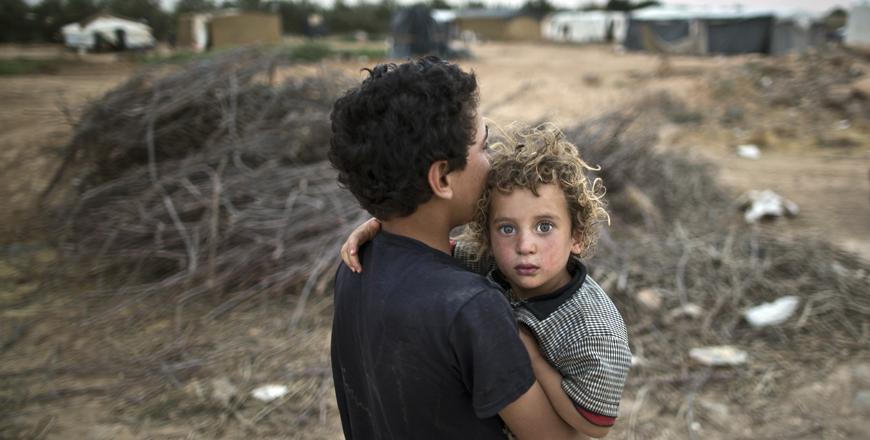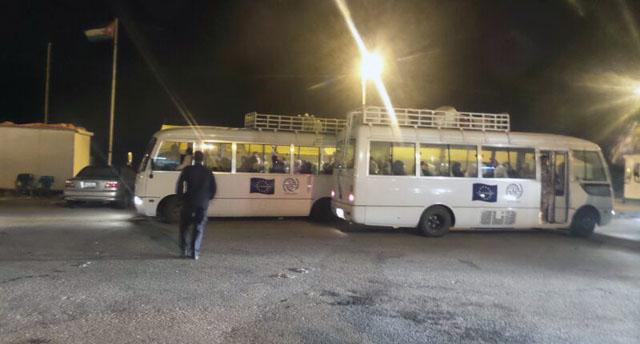You are here
Syrian refugees bear brunt of ‘high living expenses’ — IOM official
By Abeer Numan - Aug 10,2015 - Last updated at Aug 11,2015

In this photo taken last Tuesday, a Syrian refugee boy carries his younger brother back to their tent at a makeshift settlement near the Syrian border on the outskirts of Mafraq, some 80km northeast of Amman (AP photo by Muhammed Muheisen)
AMMAN — Syrian refugees are legally barred from working in Jordan, but some are managing to find jobs while others are going back to the camps due to high living expenses, and a good number are reportedly returning to Syria, according to the International Organisation for Migration (IOM).
“There are Syrians competing for jobs with migrants from other countries in unskilled trades such as construction and agriculture,” IOM Chief of Mission in Jordan Davide Terzi told The Jordan Times in a recent interview.
At present, some are finding it difficult to make ends meet and are going back to refugee camps, especially as international organistations and donors have cut down their assistance with the emergence of other crises, he said.
“Also, there are those who are going back to Syria where they have fields to cultivate or they have some links,” Terzi added.
“We have seen that there is a constant daily return to Syria. In this particular time, I believe the returnees are in greater numbers than the arrivals,” he added.
“We are estimating that in 2015, there will be around 50,000 refugees going back to Syria from Jordan,” the official said.
The reasons for this trend are not exactly clear, but some are reportedly returning to reunite with family members.
Also, the difficult living conditions at the camps, especially in terms of hygiene, water and electricity services, are elements that are causing this trend, according to IOM.
Moreover, the majority are reportedly going back to villages near Daraa captured by the Free Syrian Army, which are said to be safe.
IOM-Jordan collaborates with the Foreign Ministry, the Interior Ministry and the army — mainly Border Guards — in assisting the refugees as they arrive and resettle in camps, according to Terzi, who has concluded a six- year tenure as IOM-Jordan chief.
“When I first came here in 2009, our main activity was the resettlement of Iraqi refugees,” he said, but as a series of other problems emerged, “IOM had to deal with more challenges.”
“We work hand-in-hand with the Border Guards,” he noted.
Several countries and parties, including the US, the EU, the British and the Japanese governments support this effort, Terzi said.
IOM-Jordan has supplied the Border Guards with 60 vehicles to facilitate their work, including 30 trucks and ambulances, he added.
“We try as much as possible, just like our UN colleagues, to have funding coming to Jordan to support the refugees trickle into the Jordanian economy. This is one of the goals that we have set,” Terzi said.
The Syrian crisis has not been all negative for Jordan, he argued, noting that it has created jobs for Jordanians and has benefited the country through additional commercial activity.
“IOM is guided by the principle that migration benefits development,” the mission chief said, conceding that this has to be structured and well-managed.
At present, thousands of Syrian refugees are trying to be smuggled to Europe, incurring high risks and endangering their lives, in the absence of work opportunities in their country and in the region, in general, Terzi said.
“We have not managed to put our finger on the routings yet,” he said, but smugglers are exploiting middle-class Syrians, and they keep changing their routes whenever they learn about preventive measures.
This has been raising a great deal of concern with different humanitarian agencies and countries — including Jordan and donor nations — looking into it and trying to stop it, the IOM-Jordan chief pointed out, expressing confidence that this illegal activity will be gradually reduced.
“I am confident that the government will put to force mechanisms to somehow reduce the phenomenon,” he noted.
“The smuggling and trafficking of human life is a multi million [dollar] industry,” he said.
It is a service provided by the smugglers to people who have money to pay. In some cases, these people might acquire a debt that they will have to pay once they reach their destination through labour or after working in different nations, Terzi explained, reiterating that not all refugees are running away from conflicts.
“We are working with the government in counter-trafficking efforts, in illustrating best practices, helping with training and securing funds to assist [it],” he added.
In 2014, the IOM resettled 30,000 Syrians refugees from the region in third countries, with around 7,000 to 8,000 from Jordan. For 2015, the target is 50,000 Syrians to be resettled from the Middle East and North Africa, Terzi added.
Related Articles
The Korean embassy has presented eight vehicles to the International Organisation for Migration (IOM) in Jordan to facilitate the provision of aid for Syrian refugees and host communities.
More than three years into the Syrian crisis, refugees continue to trickle into Jordan on a daily basis, with an average of 300 border crossings every day, according to Davide Terzi, International Organisation for Migration (IOM) chief of mission to Jordan.
The European Union on Thursday announced an additional 20 million euros in financial assistance to Jordan help mitigate the impact of the refugee burden.















